

Nobody's Watching: Proctoring in Online Learning. Online Learning Nobody's Watching: Proctoring in Online Learning There is no single best way to handle proctoring for digital courses, as this community college system pilot discovered.
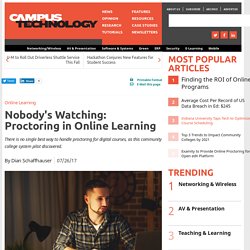
How to Cheat your Way Through School. When you hear about cheating in school, you hear stories such as paying another student to take your standardized test, using an app that does math for you, or my favorite, parents feeding test answers to their kids.
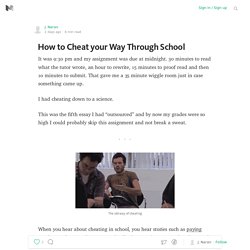
I believe that in the world we live in these techniques are no longer necessary. I learned to leverage the global online marketplace (think uber, airbnb, virtual assistants, etc) to excel in school. Note: I do NOT promote or condone my actions. I was in a unique situation in my life where my personal life and physical health were deteriorating due to a combination of factors.
My only goal is to discuss and reflect upon my experience. In 2012, just before starting my second semester at university, my life fell apart physically and mentally. Online “Tutoring” Before I continue let’s talk a little bit about the world of online academic ‘tutoring’. In a previous life I had been involved in this business, earning around 800 dollars a month. The Method What happened? Aftermath. Five Types of Quizzes That Deepen Engagement with Course Content - Faculty Focus. I’ve been rethinking my views on quizzing.
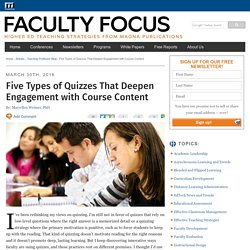
I’m still not in favor of quizzes that rely on low-level questions where the right answer is a memorized detail or a quizzing strategy where the primary motivation is punitive, such as to force students to keep up with the reading. That kind of quizzing doesn’t motivate reading for the right reasons and it doesn’t promote deep, lasting learning.
But I keep discovering innovative ways faculty are using quizzes, and these practices rest on different premises. I thought I’d use this post to briefly share some of them. Mix up the structure – Elizabeth Tropman makes a strong case for reading quizzes (highlights from her piece appear in the March issue of The Teaching Professor). Tips to Reduce the Impact of Cheating in Online Assessment. Preserving the integrity of student learning assessment is as much of a priority for online courses as it is for traditional face-to-face instruction.
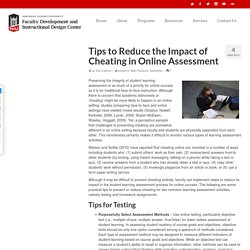
Although there is concern that academic dishonesty or ‘cheating’ might be more likely to happen in an online setting, studies comparing face-to-face and online settings have yielded mixed results (Grijalva, Nowell, Kerkvliet, 2006; Lanier, 2006; Stuber-McEwen, Wiseley, Hoggatt, 2009). Cheating in Online Courses: The Student Definition. Online Courses Can Offer Easy A's via High-Tech Cheating - Technology. By Jeffrey R.
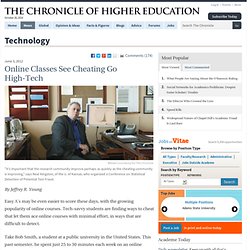
Young Easy A's may be even easier to score these days, with the growing popularity of online courses. Tech-savvy students are finding ways to cheat that let them ace online courses with minimal effort, in ways that are difficult to detect. Take Bob Smith, a student at a public university in the United States. This past semester, he spent just 25 to 30 minutes each week on an online science course, the time it took him to take the weekly test. His secret was to cheat, and he's proud of the method he came up with—though he asked that his real name and college not be used, because he doesn't want to get caught. More on his method in a minute. This prediction has not escaped many of those leading new online efforts, or researchers who specialize in testing.
In the case of that student, the professor in the course had tried to prevent cheating by using a testing system that pulled questions at random from a bank of possibilities. Mr. Countering the Cheaters Mr. Mr. Mr. For Some Students, Customized Online Learning Is Best - Times of San Diego. By Kevin Nicolls It’s 2014.
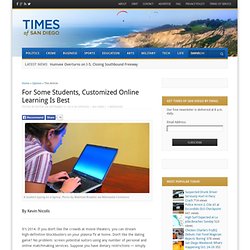
If you don’t like the crowds at movie theaters, you can stream high-definition blockbusters on your plasma TV at home. Don’t like the dating game? No problem: screen potential suitors using any number of personal and online matchmaking services. Suppose you have dietary restrictions — simply visit your local bookstore for shelves full of plans that accommodate a myriad of fitness goals, food allergies, and nutrition needs. In this day and age, nearly every aspect of life is customizable. In recent years, we have come to see the benefit of customizable education as well. How do you know if your child is better suited to an online learning environment than the classroom of your district high school?
Three Actors that Contribute to Student Success in Online Courses: The Institution, Instructor and Student. This post examines three actors that are essential to student success in online courses: 1) the institution, 2) the instructor and, 3) the student.
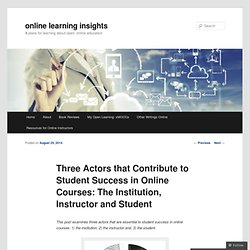
Actors Contributing to Student Success in Online Courses What contributes to student success in a course delivered online? To consider the question from a different perspective one can pose the question this way—who is ultimately responsible when students are not successful—when they fail the course for instance?